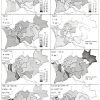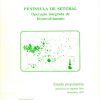Preparatory Study on an Integrated Development Operation for the Peninsula of Setúbal
The Peninsula of Setúbal entered in a critical phase in the second half of the seventies, which was accentuated in the eighties, due to the failure of the economic model in place, which was based on a small number of large business units covering a range of sectors that have entered simultaneously in crisis: shipbuilding and repair, heavy mechanical engineering, siderurgy and chemical. The sharpening of the crisis, from 1983 on, led to disinvestment and closure of many businesses, high levels of dismissals, non-payment or late payment of wages.
On the one hand, the study allowed to define the contours of the crisis, which turned out to be structural in nature, showing a very fragile economy in recessive contexts. However, it revealed the existence of endogenous resources and capabilities able to start the recovery of part of the existing economic structure and diversify it. The strategy, set as the basis of an integrated development, pointed out: the diversification and modernization of the economic structure; the maintenance of the manufacturing economy though grounded in a business environment much more robust, flexible and diversified; the increase of the importance of services, especially those related to tourism, transport and communications, business services and services to the community.




